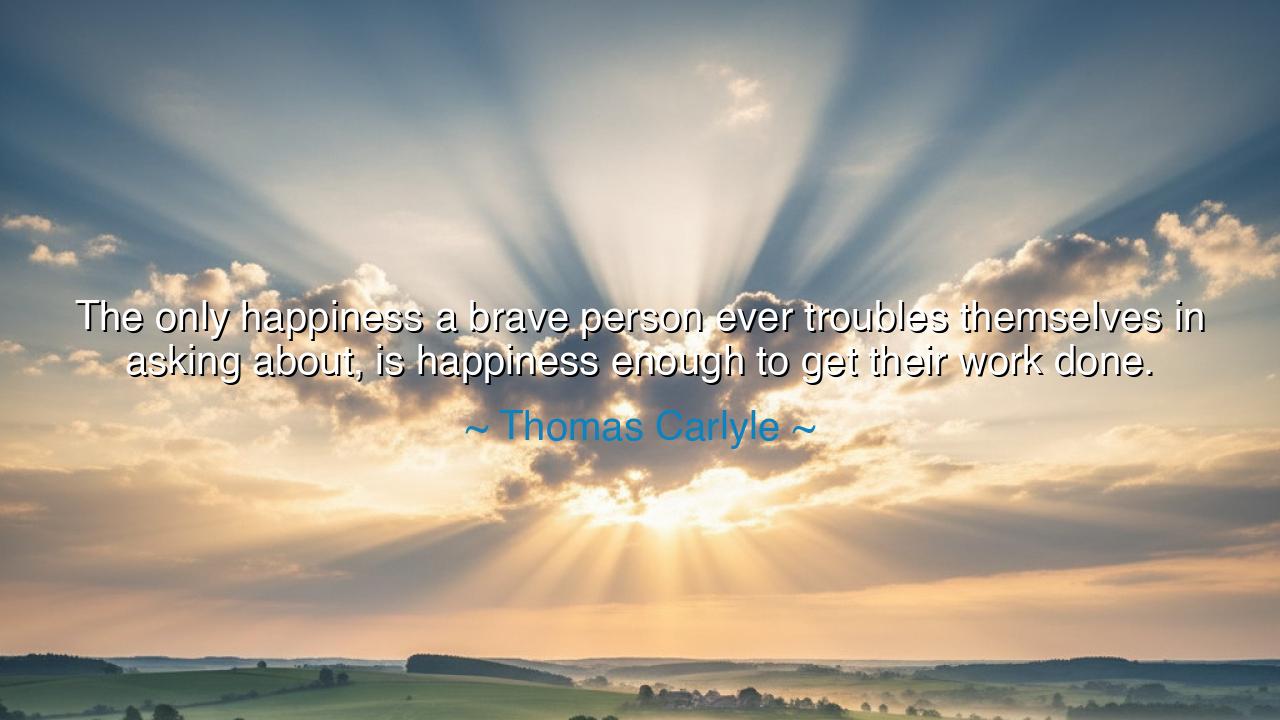
The only happiness a brave person ever troubles themselves in
The only happiness a brave person ever troubles themselves in asking about, is happiness enough to get their work done.






In the thunderous words of Thomas Carlyle, prophet of industry and moral strength, we hear the call of duty echo across the centuries: “The only happiness a brave person ever troubles themselves in asking about, is happiness enough to get their work done.” It is a saying forged in the fire of labor and conviction—a truth that speaks not to comfort, but to courage, not to pleasure, but to purpose. For Carlyle, the essence of a noble life lies not in chasing happiness, but in doing one’s work—in fulfilling one’s appointed task with steadfast heart and unyielding will. The brave soul, he tells us, does not waste his spirit in longing for ease; his joy is born in the struggle itself.
The origin of this wisdom comes from an age when Carlyle, that great Scottish thinker of the 19th century, watched the world change beneath the roaring machines of the Industrial Revolution. He saw humanity tempted by material ease and restless indulgence, and he spoke as one crying out against idleness and despair. To him, the highest calling of man was work—not as drudgery, but as divine purpose. Labor, he believed, was the means by which the soul found meaning and by which chaos was turned into creation. Thus, happiness, for the strong, was never a goal to be pursued but a flame that arose naturally from faithful labor.
This teaching stands in contrast to the restless search for pleasure that defines so many lives. Carlyle warns that those who chase happiness as an end will never find it; it slips through the hands of those who grasp too tightly. But the brave person, he says, does not seek to be happy—they seek to be useful, to act, to endure, to bring order where there is none. In the midst of that struggle, they find a quiet, enduring joy: the joy of having done what must be done. It is the happiness of the builder who lays the final stone, the writer who finishes the final page, the soldier who keeps the line unbroken. True happiness is not the absence of toil; it is the soul’s contentment in the midst of toil.
We see this principle embodied in the life of Florence Nightingale, the “Lady with the Lamp,” who walked among the wounded of war, her hands trembling but her purpose firm. She did not seek comfort, nor the praise of men, nor even peace for herself. What she sought was to serve—to heal, to restore, to bring light into suffering’s darkness. Her happiness was not of the fleeting kind that rests on circumstance; it was the quiet, enduring joy of a soul that has given itself to a worthy task. When others collapsed under exhaustion or despair, she rose, sustained not by rest, but by duty fulfilled. Her life became the living echo of Carlyle’s creed: that the brave require only enough happiness to continue their sacred work.
Carlyle’s words also carry a stern but liberating message: that we must not wait for perfect conditions to begin our labor. The coward waits for inspiration, for comfort, for joy to descend before they act. The brave, however, rise and act regardless of mood or circumstance. They find their joy in the doing, not the dreaming. To such a soul, work itself becomes worship. And when hardship comes, as it must to all, they do not crumble beneath it—they are strengthened by it. For them, happiness is not a prize granted by fortune, but a fire kindled by perseverance.
This is not to say that Carlyle despised joy. On the contrary, he understood that joy is the natural fruit of purpose. When one’s heart is set upon a worthy task, joy follows like a loyal companion, walking quietly beside the weary traveler. But when one chases joy itself, the journey becomes aimless, and the soul is left hollow. To the ancients, this truth was well known. The philosopher Aristotle wrote that happiness—eudaimonia, the flourishing of the spirit—arises not from pleasure but from virtuous activity, from the steady exercise of one’s gifts in accordance with purpose. Carlyle, centuries later, speaks in that same tradition: the brave do not ask, “Am I happy?” They ask, “Am I faithful to my work?”
So let this be the lesson passed down through the generations: seek not happiness, but duty; not ease, but purpose. If you would find joy, let it be in the labor of your hands, the steadfastness of your heart, the courage to continue even when comfort has fled. For happiness that depends on circumstance is fragile, but happiness born of commitment is eternal. The storm may rage, the world may fail, but the worker who has given their all will find peace in their soul.
And when the day ends, and the light fades from your task, you will look back—not with regret, but with quiet pride. For you will have known the truest joy: not the happiness of idleness, but the happiness of purpose fulfilled. As Thomas Carlyle teaches, the brave man asks not for endless delight, but only for enough light to finish his work—and in that labor, he finds the only happiness worth having.






AAdministratorAdministrator
Welcome, honored guests. Please leave a comment, we will respond soon